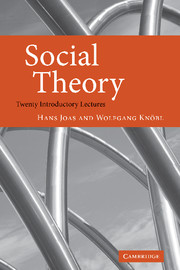Book contents
- Frontmatter
- Dedication
- Contents
- Introduction
- I What is theory?
- II The classical attempt at synthesis: Talcott Parsons
- III Parsons on the road to normativist functionalism
- IV Parsons and the elaboration of normativist functionalism
- V Neo-utilitarianism
- VI Interpretive approaches (1): symbolic interactionism
- VII Interpretive approaches (2): ethnomethodology
- VIII Conflict sociology and conflict theory
- IX Habermas and critical theory
- X Habermas' ‘theory of communicative action’
- XI Niklas Luhmann's radicalization of functionalism
- XII Anthony Giddens' theory of structuration and the new British sociology of power
- XIII The renewal of Parsonianism and modernization theory
- XIV Structuralism and poststructuralism
- XV Between structuralism and theory of practice: The cultural sociology of Pierre Bourdieu
- XVI French anti-structuralists (Cornelius Castoriadis, Alain Touraine and Paul Ricoeur)
- XVII Feminist social theories
- XVIII A crisis of modernity? New diagnoses (Ulrich Beck, Zygmunt Bauman, Robert Bellah, and the debate between liberals and communitarians)
- XIX Neo-pragmatism
- XX How things stand
- References
- Author index
- Subject index
XIX - Neo-pragmatism
Published online by Cambridge University Press: 05 June 2014
- Frontmatter
- Dedication
- Contents
- Introduction
- I What is theory?
- II The classical attempt at synthesis: Talcott Parsons
- III Parsons on the road to normativist functionalism
- IV Parsons and the elaboration of normativist functionalism
- V Neo-utilitarianism
- VI Interpretive approaches (1): symbolic interactionism
- VII Interpretive approaches (2): ethnomethodology
- VIII Conflict sociology and conflict theory
- IX Habermas and critical theory
- X Habermas' ‘theory of communicative action’
- XI Niklas Luhmann's radicalization of functionalism
- XII Anthony Giddens' theory of structuration and the new British sociology of power
- XIII The renewal of Parsonianism and modernization theory
- XIV Structuralism and poststructuralism
- XV Between structuralism and theory of practice: The cultural sociology of Pierre Bourdieu
- XVI French anti-structuralists (Cornelius Castoriadis, Alain Touraine and Paul Ricoeur)
- XVII Feminist social theories
- XVIII A crisis of modernity? New diagnoses (Ulrich Beck, Zygmunt Bauman, Robert Bellah, and the debate between liberals and communitarians)
- XIX Neo-pragmatism
- XX How things stand
- References
- Author index
- Subject index
Summary
As our remarks on symbolic interactionism in Lecture VI laid bare, the founding generation of American sociology, such as George Herbert Mead and the members of the Chicago School of sociology, had close links with American pragmatist philosophy. It would in fact be fair to say that authors such as Mead played a crucial role in developing pragmatist ideas and harnessing them for the analysis of social processes and relations. There is thus no doubt that pragmatist philosophy strongly influenced the development of American sociology, at least until well into the 1930s.
But pragmatism's influence on sociology subsequently diminished markedly. One of the key factors in sociologists' increasing lack of interest in pragmatist thought was Parsons' contribution to the establishment of a sociological canon, a contribution which resulted, with some delay, from his The Structure of Social Action, first published in 1937. In Lectures II and III we alluded to the fact that those thinkers whom Parsons declared the key founding fathers of sociology (especially Weber and Durkheim) were exclusively European. American authors influenced by pragmatist thought he ignored entirely. Given the emerging dominance of Parsonian sociology in the late 1940s, it is unsurprising that the development of sociological theory occurred almost exclusively without reference to pragmatist traditions. Only in the 1960s did this begin to change to some extent, when symbolic interactionism positioned itself as a ‘new’ theoretical approach and as an alternative to Parsonianism. Yet symbolic interactionism was not really ‘new’.
- Type
- Chapter
- Information
- Social TheoryTwenty Introductory Lectures, pp. 500 - 528Publisher: Cambridge University PressPrint publication year: 2009

